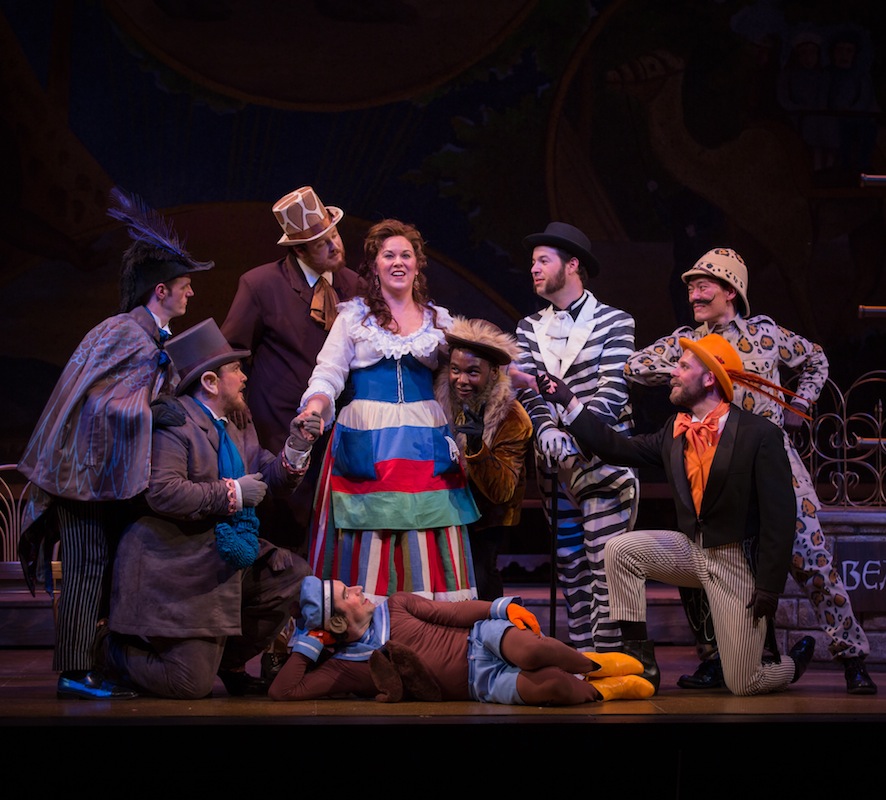Too silly, too silly: Comic one-acts lighten up Odyssey Opera’s “British Invasion”

Sadie Gregg (center) in Odyssey Opera’s production of Sir Arthur Sullivan’s “The Zoo.” Photo: Kathy Wittman
If Odyssey Opera’s month-long festival of British music were a symphony, this weekend’s double bill would be the scherzo.
No “British Invasion”—as Odyssey Opera bills its festival—would be complete without some inspired silliness, and the company checked that box in style Friday night at the Boston University Theatre with a droll pairing of one-acts, Arthur Sullivan’s The Zoo and William Walton’s The Bear.
Tuneful numbers, singing ranging from good enough to more than that, evocative décor, some nice bits of comic invention, and stylish orchestral support kept things bubbling during the evening’s brief span of barely two hours.
Sullivan composed The Zoo to a libretto by B.C. Stephenson simultaneously with his first big hit with W.S. Gilbert, Trial by Jury. One must admit, Stephenson lacked Gilbert’s rapier wit and psychological insight, and his libretto was a flimsy assemblage of theatrical clichés—the suicidal disappointed lover, the nobleman disguised as a commoner, the switched medicine bottles—on which to hang choruses, character arias, love duets, etc.
Still, the librettist managed some clever rhymes, and enough of Sullivan’s melodic magic was sprinkled through the score to make an attractive package, especially when accompanied by the visual pleasures of Stephen Dobay’s set and Amanda Mujica’s costumes.
As the curtain went up, a smattering of applause greeted the zoo scene, with its handsome painted backdrop of animals in oval frames, and the bustling chorus curiously attired in Victorian finery with animal-print patterns—the better, it turned out later, to portray not only zoo visitors but the animals themselves. (This inspired bit of double-casting appeared to be director Lynn Torgove’s idea, not the librettist’s.)
Vocally, the opera got off to a good start with a crisp chorus and tenor Daniel Shirley, with a rope around his neck as the lovelorn chemist Carboy, bemoaning his plight in splendidly clear diction. Soprano Chelsea Beatty sang prettily as his love interest, the grocer’s daughter Laetitia.
Mezzo-soprano Sadie Gregg and baritone Colin Levin gave spirited performances as Eliza Smith and Thomas Brown, the improbable pair of a refreshment-stand girl with the duke-in-disguise who took a job as a zoo janitor just to be near her. Gregg ventured a Cockney twang at the outset, but wisely abandoned it in favor of letting her pert expression and sturdy voice convey the character of a working girl with many suitors.
Levin’s role called for him to be not just lovesick, but physically ill from gorging on Eliza’s sweets. This led to one of the score’s more original numbers, a drunk-scene variation in which the newly unmasked duke attempted to give a speech but needed the chorus to finish his sentences.
The chorus, in fact, played a large role even by this genre’s standards, frequently restraining or egging on the main characters. Director Torgove effectively choreographed their stage-filling presence as they smartly sang their parts.
Bass-baritone Simon Dyer had vocal power to spare as Laetitia’s father Grinder, implacably irate at the thought of his daughter marrying an apothecary.
In the pit, James Blachly conducted the orchestra and chorus in vivacious light-opera style.
Dial ahead a century or so, get a little more serious (but not much), and you come to William Walton’s The Bear, with a libretto adapted by Paul Dehn and the composer from the play of the same name by Anton Chekhov.
All involved with this bit of theater seemed concerned to lower expectations about it, beginning with Chekhov himself, who referred to his play as “a stupid vaudeville,” and continuing to Walton, who called his opus “an extravaganza in one act,” perhaps to distinguish it from his only previous opera, the Shakespearean tragedy Troilus and Cressida.
And indeed, Chekhov’s original seemed to be a send-up of his more serious plays, with their Russian milieu in which a threadbare aristocracy comes up against nouveau-riche landowners of peasant stock. Walton added a layer of 20th-century irony in a pointed, economical score touched by jazz and Shostakovich, deftly rendered on Friday by conductor Gil Rose and the orchestra.
As the widow Popova, soprano Janna Baty extravagantly warbled and blubbered over portraits of her late husband and of her horse, making it clear which one she held in higher affection. A smart comedienne, Baty was not above borrowing a page or two from Miss Piggy, alternately wheedling and raging as she confronted the oafish landowner Smirnov and his demands for repayment of her husband’s debt. (Popova and Smirnov are as generic names in Russian as Smith and Brown were in Sullivan’s opera.)
Physically imposing with a booming bass to match, Stephen Salters was comically desperate as the creditor pursued by creditors of his own. He might have found a few more notes to play in his character, first as the bear in a china shop, later as the sarcastic teaser and finally the successful suitor.
Bass-baritone Dyer returned as the opera’s only other character, the old servant Luka, drolly lascivious as he urged his mistress to go out and enjoy life again. Dyer brought vocal power and energy to the role, but also a physical twitchiness that was more distracting than funny.
Dobay’s set, with its ornate double doors for dramatic entrances and exits, economically evoked a Russian country house, while Mujica dressed the characters to visibly embody their roles: black lace and a huge bustle for the potentially merry widow, and a huge fur hat, fur coat, and fur waistcoat for the bear that hunted her.
If the Sullivan-Walton double-bill didn’t quite unearth buried treasure, it certainly turned up a sparkly doubloon or two.
The Zoo and The Bear will be repeated 3 p.m. Sunday. odysseyopera.org; 617-585-1260.
Posted in Performances




